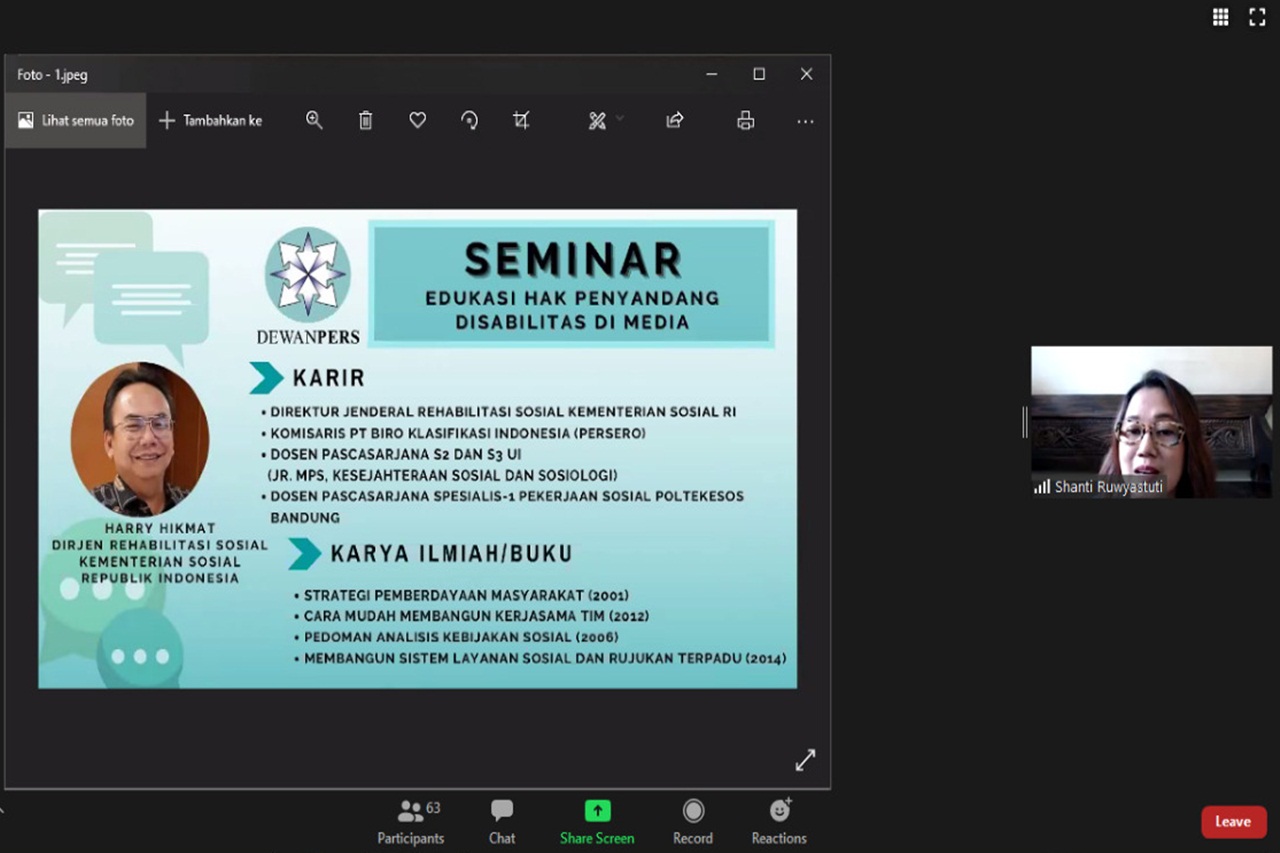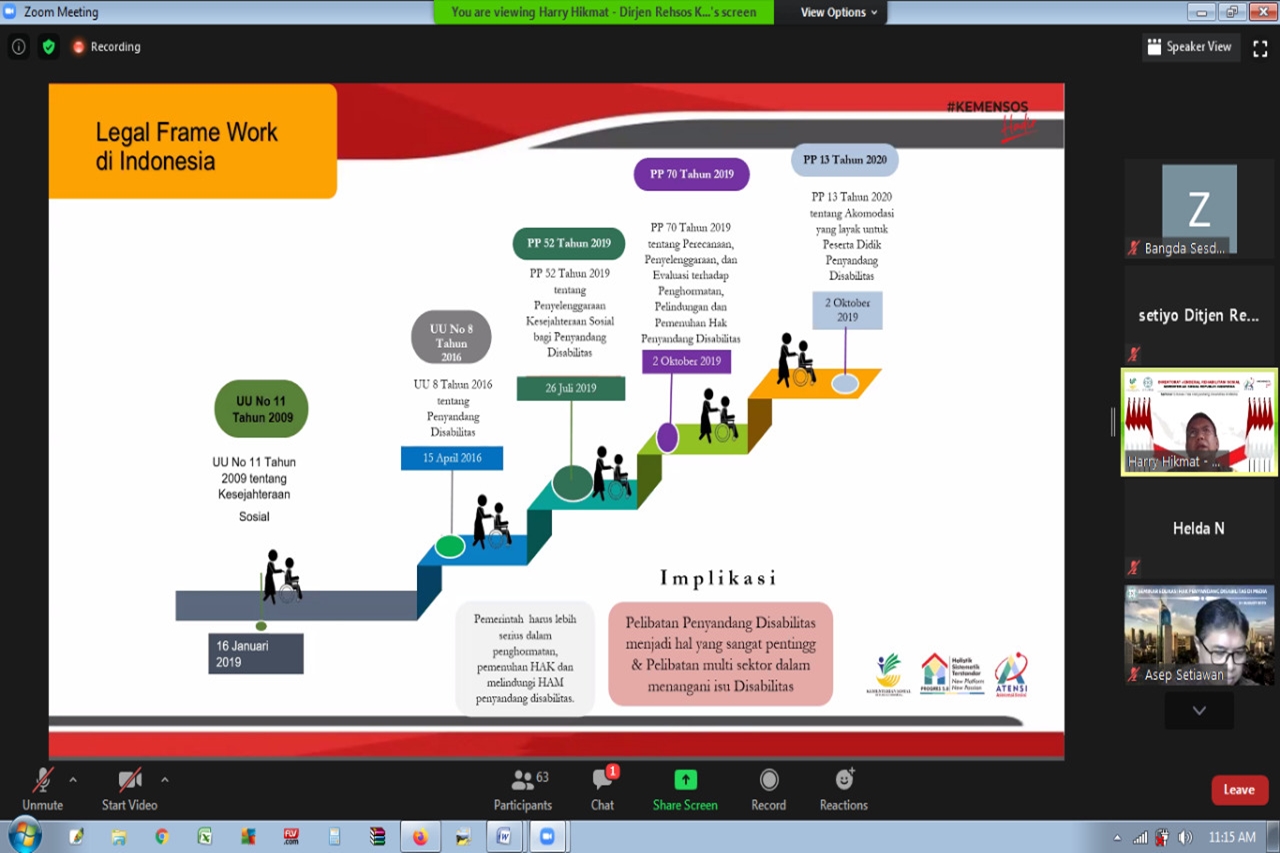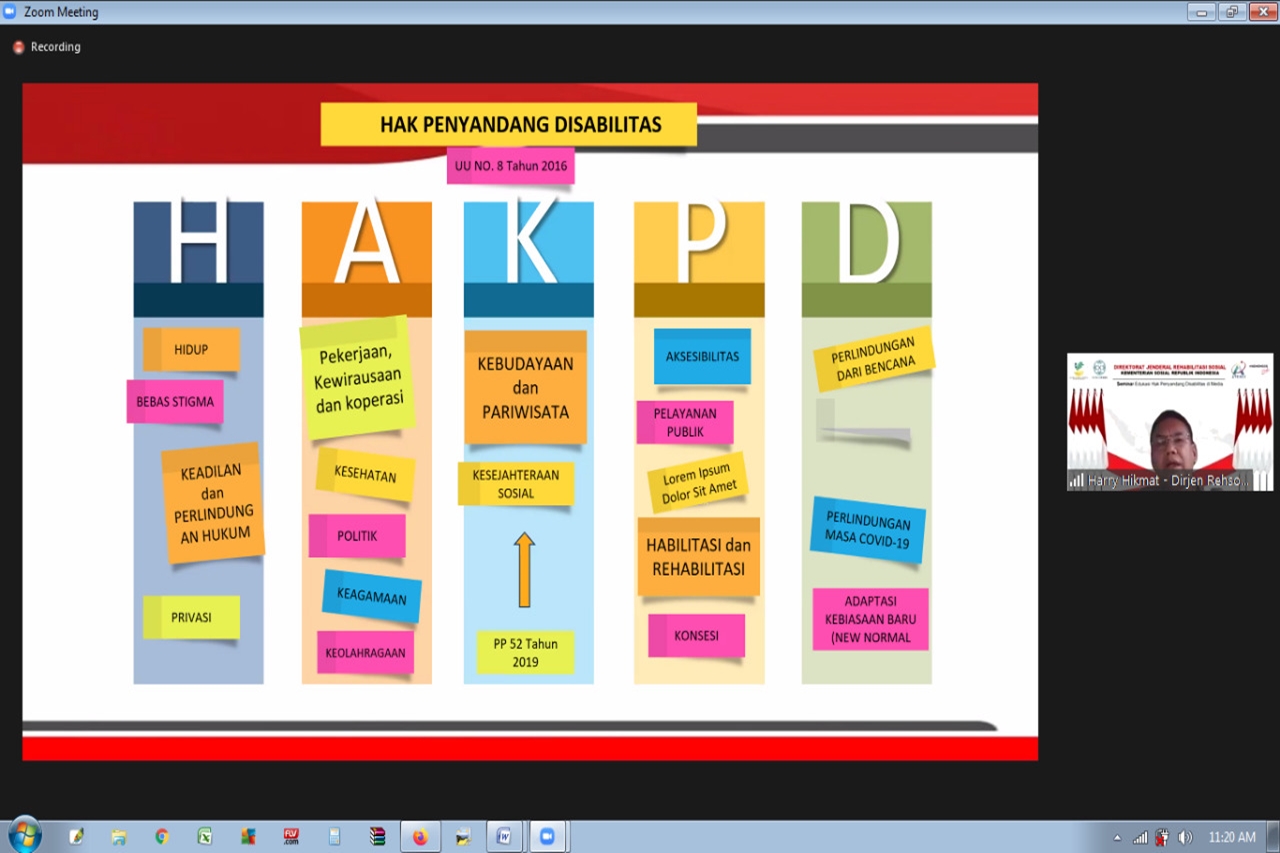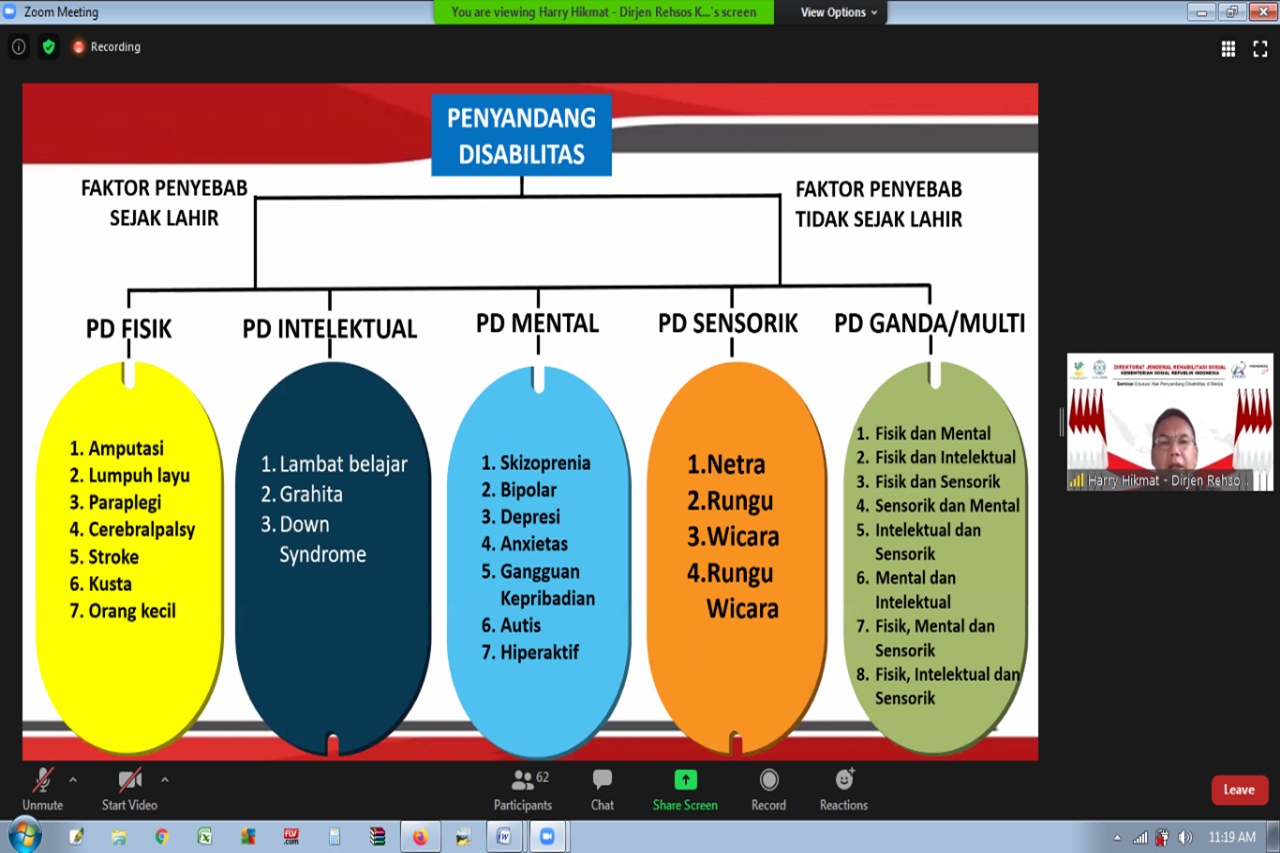JAKARTA (August 31, 2020) - The Director General of Social Rehabilitation of the Indonesian Ministry of Social Affairs, Harry Hikmat was one of the speakers at the "Educational Seminar on the Rights of Persons with Disabilities in the Media" organized by the Press Council.
Harry invites members of the press to convey information based on the latest or most recent laws and regulations, so that there is a conformity of understanding in conveying information to the public, including persons with disabilities as subjects and persons with disabilities as recipients of information who do require a variety of up-to-date information.
According to Harry, Indonesia does not yet have national data on persons with disabilities that describes the entire population with various disabilities, and the characteristics of each disability. "This is a challenge in the future, but there are several references that we can use, even though they are surveys, but we can obtain some basic information and the characteristics of various disabilities based on the National Economic Survey (Susenas)," said Harry.
At the Ministry of Social Affairs, there is Integrated Data on Social Welfare (DTKS) which can provide an overview of socioeconomic status, which is very necessary in order to deal with various social problems or levels of vulnerability as well as efforts to improve welfare. The Directorate of Social Rehabilitation of Persons with Disabilities (Dit RSPD), since 2017 has developed an Information System for Persons with Disabilities (SIM PD).
“Right now we are in the process of integrating SIM PD and DTKS. With the existence of a general and specific DTKS that collects data on persons with disabilities, it will provide a stronger picture of matters related to the condition of persons with disabilities,” said Harry.
The Director General of Social Rehabilitation said that a number of ministries/institutions do not yet have a complete understanding of persons with disabilities which refers to the Convention on the Rights of Persons with Disabilities (CRPD), because they still use old terms as referred to in Law No. 4 of 1997 on persons with disabilities, so it needs to be fixed together. The Ministry of Social Affairs has ensured through the Ministry of Home Affairs that in the population administration system, no longer uses the term disability, but persons with disabilities in accordance with Law No. 8 of 2016.
“The variety of disabilities in Law No. 8 of 2016 includes physical, intellectual, mental, sensory and multiple categories. Often this is not sufficiently widely informed about this agreed range of disabilities,” said Harry. Some information is sometimes still biased, such as autism and cerebral palsy, requiring more ethical ways to be conveyed to the public.
The Ministry of Social Affairs is very concerned in the process of drafting the RPP on social rehabilitation as an effort to fulfill the rights of persons with disabilities. If the RPP on social rehabilitation and rehabilitation is stipulated, then all centers as UPT within the Ministry of Social Affairs and local government social institutions or LKS-LKS must also be able to ensure that there is a rehabilitation process from an early age.
"We admit, the Ministry of Social Affairs is often more focused on the rehabilitation process, not proportional to the habilitation activities, especially for children with disabilities at an early age," explained Harry.
Citing the survey results from the Statistics Indonesia (BPS, 2015) Harry delivered a presentation of the Indonesian population who tend to watch television more than 90%. Meanwhile, those who listen to the radio and read newspapers tend to decrease. This of course has implications for the pattern of access to media that can be specifically responded to persons with disabilities.
In Law No. 8 of 2016, the rights of persons with disabilities related to literacy include rights in the fields of education, accessibility (Braille literacy, hearing, etc.), public services, expression, communication and obtaining information.
“We hope that the involvement of the press together with the government conveys the main ideas, the rights of persons with disabilities, so that we respect the rights of persons with disabilities. To provide protection from disability for the possibility of unwanted social risks such as violence, neglect, discrimination. And various regulations regarding disability can be informed,” said Harry.
Furthermore, according to Harry, the achievement of fulfilling the education rights of persons with disabilities, both from literacy rates, pure participation, certificates, appears to be much lower than non-disabled persons. “We are concerned that the continuity of education for persons with disabilities whose gap since junior high school, senior high school and university levels is very low. This will affect the access ability of persons with disabilities when it is difficult to continue their education,” said Harry.
The majority of people with disabilities have an elementary school education level and below, and most do not even have an elementary school diploma. This is a common challenge because education is an important instrument for access to information for groups of persons with disabilities.
The Ministry of Social Affairs through Balai Abiyoso made various breakthroughs to ensure literacy for people with disabilities through social rehabilitation assistance. In essence, family-based literacy is very important. Story telling for families, parenting skills, increasing family capacity are urgent things. Likewise storytelling in the community, community capacity building, formation of study groups, for example learning about Braille at the community level.
Centers/Social Institutions/residential based, need to provide wider access opportunities for persons with disabilities, such as the BLBI "Abiyoso" which provides whispering cinema facilities where various films, information, educational materials, can be heard by persons with visual sensory disabilities through the whispering cinema. Furthermore, increasing the capacity of disability assistants to be able to manage mobile access, talk books from Braille, so that they can get wider information for people with disabilities.
"We want to ensure that communication vehicles can be accessed, can be used by people with disabilities, even people with disabilities can be involved in the ownership, storage, processing, and retransmitting of information obtained to outside parties in writing, sound, images, and various related data," he said. Harry. Law No. 40 of 1999 states that there is a right of the public to know, to obtain fast, accurate and correct information, to carry out monitoring, as well as the importance of reporting on disability.
“It is very important to disseminate information about the rights of persons with disabilities, both Law No. 8 of 2016 on persons with disabilities and its derivative regulations. In government regulations, the main content is efforts to respect, fulfill rights, and protect persons with disabilities. And this needs to be disseminated and shared to the public. Most importantly, people with disabilities understand their rights in accordance with existing regulations,” said Harry.
According to Harry, the news about disability issues is relatively minimal, so information about disability to the public is inadequate, rarely being covered in the media about disability. When they are shown they are often stereotyped negatively and not properly represented. The social construction of the news puts the position of persons with disabilities at a disadvantage. These 3 points become a challenge as well as an opportunity to find a more constructive solution.
The implementation of the role and function of the press in the publication of disability issues includes creating spokespeople, namely showing that community leaders, senior government officials and well-known celebrities can work to change public perceptions about disability and raise awareness about the concerns of persons with disabilities. As influence persons who can influence people's perceptions that are still stereotyped about persons with disabilities.
Then, a change of opinion, namely we need to build using various media images and stories in the media that can influence public opinion and shape societal norms. Next,change perception, namely attention is directed to the image of disability in the media with the aim of accurately and balanced depicting disability as part of everyday life. The media plays an important role in presenting disability issues in a way that can dispel negative stereotypes and promote the rights and dignity of persons with disabilities.
Then providing various opportunities including in public events and other international anniversaries can provide opportunities to raise awareness and conduct outreach to promote disability perspectives and highlight the concerns of persons with disabilities. The Ministry of Social Affairs is committed that technical matters will be handed over to the Social Rehabilitation Center, but preventive matters, public awareness, building public opinion, developing policies and strategies are under the Ministry of Social Affairs directorate.
Some tips for reporting on disability issues include focusing on the person, not the disability, emphasizing the ability of people with disabilities, disability activities in the community, providing opportunities for people with disabilities to voice their opinions and thoughts, don't stress too much about the existence of disability heroes, don't use terms that are misleading. give negative emphasis, use language according to legislation.
The Education Webinar on the Rights of Persons with Disabilities in Media also presented 3 (three) other speakers, namely Asep Setiawan (Member of the Press Council), Agoes Rakhman (YPAC Executive Director), Cheta Nilawaty, (temporary reporter) and started with an introduction to the seminar from Mohammad NUH as Chairperson Press Council.
 English
English
 Bahasa
Bahasa




